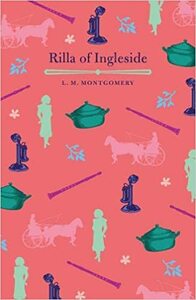Take a photo of a barcode or cover
I put off reading this again because it hurts me but I finally got there & OH BOY is As much as I love Jonathan Crombie and Megan Follows I will not admit the existence of a third movie with a plot that is not only ridiculous but also takes away Rilla's story.
Spoiler
Walter dying just as painful every time I read this as it was the first time.
emotional
hopeful
medium-paced
Plot or Character Driven:
A mix
Strong character development:
Yes
Loveable characters:
Yes
Diverse cast of characters:
No
Flaws of characters a main focus:
Yes
4.5 ★ - (loved it, favorite!)
CWs, or things that caught my attention: mentions and/or descriptions of war, death,
CWs, or things that caught my attention: mentions and/or descriptions of war, death,
Well, this is the last book in the Anne of Green Gables series that I started reading last summer in an effort to find relief from the contentious presidential campaign. Alas, that has transitioned into a contentious new administration, so I was at least grateful that I could escape for a little while to a simpler time and place - Prince Edward Island in the early 1900s. This book takes all the characters that I have grown to love up to and through "the Greatest War," WWI. It is a sentimental but satisfying read, and a lovely way to end the series - the war over, rebuilding a sense of home and security after great tragedy. The impressions, images and characters in this series remain with me fondly.
emotional
sad
emotional
hopeful
sad
medium-paced
emotional
sad
medium-paced
Plot or Character Driven:
Character
Strong character development:
Yes
Loveable characters:
Yes
Diverse cast of characters:
No
Flaws of characters a main focus:
No
lighthearted
relaxing
slow-paced
Plot or Character Driven:
Character
Strong character development:
Complicated
Loveable characters:
Yes
Diverse cast of characters:
No
Flaws of characters a main focus:
No
challenging
hopeful
informative
inspiring
lighthearted
reflective
sad
tense
medium-paced
Plot or Character Driven:
Character
Strong character development:
Yes
Loveable characters:
Yes
Diverse cast of characters:
N/A
Flaws of characters a main focus:
Yes
This last volume is my most tattered. Whole sections of pages have come unglued, the cover is no longer attached, and the dog has torn off a corner. But I still love it. There is no question that this book is the foundation of all of my knowledge of WWI, and so I have a ridiculously Canadian view of that war. I do not recall any of the lessons I learned in school about it (some vague recollection of the League of Nations...?), but the events described in this story I have very little trouble recalling.
The growth and development of Rilla centers this story, and is my favorite part. She manages to grow from a frivolous teen into a woman, taking on a rather lot of responsibility. And yet, while she tackles sewing and cooking and a baby, she still has moments of reality, when she is overwhelmed or impatient or doesn't live up to her own standards. In that aspect Rilla comes through as someone eminently relatable. From a modern perspective it's a little grating that she ends up pinning all her hopes and dreams on a man, even though she's clearly demonstrated her own abilities and interests, but in my imagination she continues to be her own woman even in marriage and perhaps even finds it in herself to be more daring and adventurous during WWII.
Despite my overall enjoyment of this, I have grown increasingly disappointed with each re-read at the slow disappearance of Anne. In this last story, she appears as a distant mother, heartbroken over her sons going to war, but she has been completely and utterly overshadowed by the focus on her children and Susan Baker. As I have gotten married and had my own children, this idea that a woman disappears as her children grow older is rather disturbing.
Reread 2020: Right now I am just thinking that this book wraps up with nary a mention of the flu pandemic that hit the island in October of 1918. Rilla and Anne were in Charlottetown (the epicenter of P.E.I.’s flu cases) at the beginning of September. Rilla and her siblings and friends would have been among the most vulnerable age group. Soldiers were coming home throughout the fall and winter (bringing virus home with them) and it is probable that Dr. Blythe would have been very much occupied with the flu crisis, even as the family was celebrating the end of the war.
https://www.theguardian.pe.ca/news/local/spanish-flu-smallpox-impacted-life-on-pei-similarly-to-covid-19-435988/
Despite this glaring omission, there is a lot in Rilla’s response to the war itself that rang relevant during a global pandemic. The gathering of necessary supplies, the monotony of sitting at home while others go out and put their lives on the line to fight and provide essential services, the need to keep spirits up, and the call to do your part whatever that may look like.
The growth and development of Rilla centers this story, and is my favorite part. She manages to grow from a frivolous teen into a woman, taking on a rather lot of responsibility. And yet, while she tackles sewing and cooking and a baby, she still has moments of reality, when she is overwhelmed or impatient or doesn't live up to her own standards. In that aspect Rilla comes through as someone eminently relatable. From a modern perspective it's a little grating that she ends up pinning all her hopes and dreams on a man, even though she's clearly demonstrated her own abilities and interests, but in my imagination she continues to be her own woman even in marriage and perhaps even finds it in herself to be more daring and adventurous during WWII.
Despite my overall enjoyment of this, I have grown increasingly disappointed with each re-read at the slow disappearance of Anne. In this last story, she appears as a distant mother, heartbroken over her sons going to war, but she has been completely and utterly overshadowed by the focus on her children and Susan Baker. As I have gotten married and had my own children, this idea that a woman disappears as her children grow older is rather disturbing.
Reread 2020: Right now I am just thinking that this book wraps up with nary a mention of the flu pandemic that hit the island in October of 1918. Rilla and Anne were in Charlottetown (the epicenter of P.E.I.’s flu cases) at the beginning of September. Rilla and her siblings and friends would have been among the most vulnerable age group. Soldiers were coming home throughout the fall and winter (bringing virus home with them) and it is probable that Dr. Blythe would have been very much occupied with the flu crisis, even as the family was celebrating the end of the war.
https://www.theguardian.pe.ca/news/local/spanish-flu-smallpox-impacted-life-on-pei-similarly-to-covid-19-435988/
Despite this glaring omission, there is a lot in Rilla’s response to the war itself that rang relevant during a global pandemic. The gathering of necessary supplies, the monotony of sitting at home while others go out and put their lives on the line to fight and provide essential services, the need to keep spirits up, and the call to do your part whatever that may look like.





